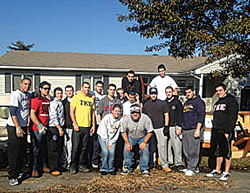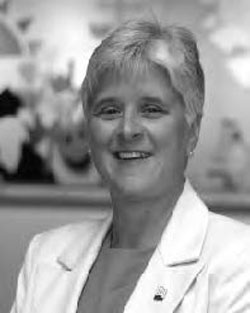The World Cinema Series hosted a virtual film discussion of Benedikt Erlingsson’s Woman at War on Thursday, Apr. 15.
Moderated by Thomas Pearson, Ph.D., the discussion featured input from faculty speakers Catherine Duckett, Ph.D., Associate Dean of The School of Sciences, Maiya Furgason, Professor in the Department of Management and Leadership, and Nancy Mezey, Ph.D., Dean of the Honors School.
Woman at War is a 2018 Icelandic-Ukrainian film centered on Halla, an eco-activist and choir conductor who aims to disrupt the newly founded operations of a Rio Tinto aluminum smelting plant in the Icelandic highlands. A forgotten application to adopt a Ukrainian child is suddenly approved, and Halla must balance her disruptive activism with the soon-to-be adoption.
“This film is a blend of adventure-thriller, environmental drama and an offbeat comedy,” Pearson said. “[An orchestra] tends to appear during moments of intense action with a Greek chorus, and there’s also a Ukrainian choir that appears in moments of self-reflection. This director, with his original vision, has thought out everything because he really wants to marry the absurd with the urgency to get his message of eco-activism across.”
The film poses two questions, Pearson explained. “What are the instruments and limits in the war between the eco-activists, the corporations and their government patrons in the fight over the natural environment, and the second question is what risks do activists, their families and friends take on their commitment to environmental justice and environmental activism.”
Duckett began her comments, stating that the film is a manifesto.
“It is a statement of intention, and in that sense it is a sort of meta-manifesto because you have Halla’s manifesto and you also have the director’s manifesto,” Duckett said. “This is of interest to me and my teaching because I’m trying to get students to find their activist voice.”
The difference between an activist and an extremist can be a matter of perspective, Duckett explained. “As a climate science communicator, one of the ways we view environmentalism in the United States is through a lens that has been filtered or clouded by extreme climate disinformation. Exxon and other corporations knew about climate change well before the American public was informed in detail and they deliberately tried to create the impression that scientists were being extremists and alarmists.”
Those who are only in their early 50s are set to experience the adverse effects of climate change by the end of their lives, Duckett explained. Young people will have the majority of their lives transformed by climate change.
“For me, the discussion of what’s appropriate activism and what is extremism is very timely and topical,” Duckett said. “We all have to decide for ourselves what we should be doing about this crisis and how we can help within the social boundaries that we work in.”
The corporation Rio Tinto itself is well over a hundred years old and is the second largest smelter of aluminum in the world, Furgason explained. Rio Tinto is a multinational with 32 subsidiary companies, producing 23 percent of Iceland’s total Gross Domestic Product (GDP).
“[Rio Tinto] uses a huge amount of electricity,” Furgason said. “The electricity in Iceland is produced from hydro power, so that’s a positive, but here’s a company that’s making 500 tons a day of aluminum. They come out with this rhetoric that says Rio Tinto has strong environmental focus and environmental issues are among the most important issues, and yet they are major violators of both human rights and environmental.”
“The first thing that really came to my mind was motherhood, and what does it mean to be a good mother,” Mezey said of the film. “There’s all sorts of literature on what it means to be a good mother, and really the definition of a good mother depends on the cultural background that you’re from. For example, with white middle-class mothers in the United States, a good mother means staying home with your kid and making sure they do everything they possibly can with this intensive mothering. For African American mothers, historically, a good mother has meant someone who has been in the workforce and can raise up her children with their community.”
When you look at the film’s protagonist, you may question how good of a mother they would be to the adopted child, Mezey pointed out. “I think initially when you look at Halla, you think ‘Wow, how can she be a mother?’ She’s an activist, an extremist. She’s blowing up things and she’s breaking the law, but she makes it clear in her mind that by doing all the things that she is doing, she is in fact a very good mother.”
PHOTO TAKEN from SBS.com




